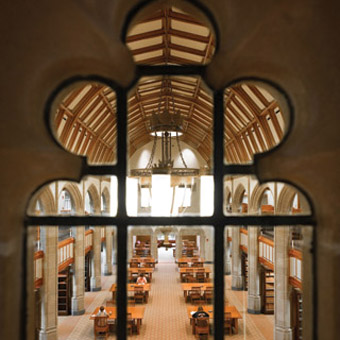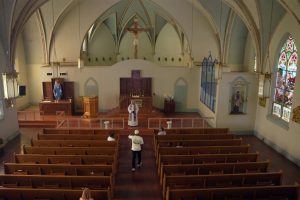The jury’s out on whether Catholic law and business schools give students a higher degree of faith.
When Brian Chan was applying to graduate business schools in 2002, finding a Catholic university was not on his wish list at all.
“I applied to the programs that had the biggest names—Harvard, Stanford, Wharton,” Chan says. “I didn’t consider whether they were Catholic or not. I went for the higher rankings.”
But now, five years after earning a master’s in business administration from the Wharton School at the University of Pennsylvania, Chan has started the Catholic MBA Network, an online group that tries to connect Catholic business students and alumni. Chan says faith has become more important to him in the years since graduation, when he entered “the real adult world.”
Now he’s trying to help Catholic business students think a little more intentionally about the role that faith plays in their education—a question that at least some professors at Catholic professional schools are encouraging their institutions to think about, too.
For the most part, the depth of a professional school’s Catholic identity is not a raging conversation on campuses today, although it can be heard at muted levels if one listens carefully in the right places. In many ways Catholic professional schools look remarkably like their secular counterparts—with religious diversity both in the student populations and among the faculty, and with instruction focused on the technical competencies required in the field.
At Loyola University Chicago School of Law, for example, Catholics make up a “distinct minority” of the tenure track faculty—fewer than a quarter, says law professor John Breen. At many Catholic universities, “the conversation [about Catholic identity] is avoided,” Breen says. “It doesn’t come up. And when it does come up, it’s addressed on a very superficial level.”
While many Catholic universities teach legal or business ethics or offer legal clinics to serve low-income clients, many state and private universities do so as well. But there are also some campuses where a sense of explicitly Catholic identity may be more evident.
“Many students come to Notre Dame because of its identity as a Catholic place,” says former law school dean and professor emeritus Thomas Shaffer. And he contends there’s a value to that identity. Catholic law and business schools can provide a “freer discussion atmosphere” in which subjects such as morality, ethics, and justice aren’t considered off-limits.
The conversation about identity in Catholic professional schools is also bringing together scholars from a variety of campuses, and in some cases a variety of religious traditions, to talk intentionally about the ways that the Catholic intellectual tradition can inform the teaching of business and law.
Notre Dame hosted a 2008 conference on “The Role of Mission-Driven Business Schools” at Catholic universities. And each year the Summer Institute on Catholic Social Thought and the Law brings together about 30 law professors from around the country. Amy Uelmen, director of the Institute on Religion, Law, and Lawyer’s Work at Fordham University, describes it as a “very vibrant, cross-school discussion” about how a religious dimension can inform legal teaching and scholarship.
Those professors are not necessarily Catholic, she says. “Part of the challenge is to be open to the unexpected in terms of the kinds of people who will resonate with these ideas.”
Mission-driven degree
At Boston College Law School, associate professor Father Gregory Kalscheur, S.J. gives an orientation address each year for the incoming first-year students. He reminds them that Boston College was founded by the Jesuits and asks them to answer two questions: “What are the hopes and desires of my heart that have called me to enter law school?” and “Who am I becoming as a person as I enter more deeply into the life of the law?”
These kind of questions spoke to Erin O’Neill, who graduated from Notre Dame Law School in 2010. O’Neill, who now works for a law firm in Los Angeles, says that “the University of Notre Dame Law School takes pride in educating a ‘different kind of lawyer.’ What makes Notre Dame lawyers fundamentally different begins not with the law, but with our faith.”
This “mission-driven education,” as administrators call it, has real-world implications. “We went beyond the black letter law and explored how we can use our logic and compassion to serve others,” O’Neill says. “We learned that precedent can be overturned when zealous advocates fight against unfairly disparate impact, we learned that intelligence without work ethic is a foolish waste, and we learned that God is not interested in our career as a lawyer but rather our work as a Christian.”
How these conversations about Catholic identity play out in graduate schools varies from campus to campus, in part because each school has its own mission statement, its own history, and its own charism if it’s connected to a religious order.
At Boston College “there are things I’m trying to do as a teacher that I’m conscious of doing as a Jesuit,” Kalscheur says. “One thing is to always be attentive to the people who are behind the cases.” And that involves recognizing that legal cases involve the lives of real people.
It’s important to have “a place where the insights from the faith tradition in general and the Catholic intellectual tradition in particular can be part of the conversation,” Kalscheur says.
“It can be a complicated kind of enterprise. How do you make sure the environment is open, in which pluralism is valued and respected, and at the same time value the importance of the Catholic voice as part of the conversation? It can be a tricky thing, but it’s important to struggle with.”
Choosing a vocation
For some students that sense of Catholic identity and vocation is also central as they complete graduate school and try to figure out what comes next.
Dan Buckley graduated from St. John’s Law School last spring and was president of the Catholic Student Association there.
Although St. John’s is a Catholic university, “very few of the students were practicing Catholics,” Buckley says. “And the ones that were, it didn’t really factor in to their decision to attend St. John’s.”
When applying for law school, he turned down a full scholarship to another school because he wanted to go to St. John’s—even though it would cost him more.
“I was able to go to Mass daily, and that’s something that was a huge deal for me,” he says. “It has a beautiful chapel on the campus, just a few steps from the law school.”
Buckley liked seeing a cross in the cafeteria and crucifixes on some of the office walls. He did not find, however, that the instruction he received was any different than he would have received at a secular school.
“Inside the classroom it’s the same as any other classroom: the same curriculum, the same subject matter,” Buckley says. “Most of the faculty did not identify themselves as religious. Or they identified with another religion besides Roman Catholicism.”
“[The students] are very mixed. All walks of life. All races, all religions. They pick St. John’s because St. John’s has a pretty good reputation in New York. For the vast majority—maybe 99 percent—it’s because of the quality and the reputation of the school.”
St. John’s may have made a difference, however, in Buckley’s career path. He says he entered law school with the intent of pursuing corporate law but was influenced by what the Vincentian priests said during their homilies about serving the poor and underprivileged day after day at St. John’s.
For now Buckley works at a nonprofit assisting people who have family court cases. “There’s plenty of time in life to work hard and make money,” he says. He’s 27 and not married. “I have the luxury right now of not making a million dollars and being OK with it.”
History lesson
John Breen, a product of a Catholic high school and college and then Harvard Law, says he came to teach at Loyola 15 years ago in part because of its Catholic Jesuit affiliation. “You come here and you find out that it is, but only on a very superficial level.”
Breen has written about the question of Catholic identity at Catholic law schools—and says what’s happened at Loyola is typical in many ways of the majority of Catholic law schools.
Most of the Catholic law schools are Jesuit, he says—14 of the 26. Many were founded in urban areas in the early 20th century as a way to give Catholic immigrants or their children—who often would not be admitted at other law schools—a path into the profession. Many started as night schools, as the men who attended worked full time. Jews also enrolled, because they, too, were excluded from other law schools.
Breen says these schools never were founded for the purpose of teaching from the Catholic intellectual tradition but to open the doors for Catholics into the legal profession. That made it harder later on, when some wanted to explore the idea of strengthening their Catholic identity. It also helps explain why some of the newer Catholic law schools, such as the University of St. Thomas in St. Paul, Minnesota, may have a stronger sense of standing in the Catholic intellectual tradition than those that have been around for decades.
“What you could say about those schools up until the late ’60s or early ’70s is they were Catholic,” Breen says, culturally and religiously. It wasn’t something they were ashamed of. It was there in the annual communion breakfast, the Catholic chaplain and Catholic clergy on the faculty, and Catholic student retreats. Many of the teachers were Catholic graduates of those same schools.
Then things began to change. Law school enrollments began rising as women and minorities enrolled, Breen says. To accommodate larger classes of students, more professors were hired—and fewer of them were Catholic. With time, with bigger classes and more diversity, the Catholic feel of some of the schools began to erode.
Brand identity
The discussion of the identity of Catholic professional schools is at some levels also part of a broader discussion of the role and nature of Catholic higher education—a discussion that took shape after the Second Vatican Council and when, in 1990, Pope John Paul II issued Ex Corde Ecclesiae (From the Heart of the Church) on what it means to be a Catholic university.
Michael Naughton, director of the John A. Ryan Institute for Catholic Social Thought at the University of St. Thomas, understands that Catholic professional schools have a dual role. First they have to teach technical competency.
“If a Catholic business school doesn’t teach students about reading a balance sheet and doing present value calculations, how to segment markets, and how to deal with compensation systems, it is not doing its job,” says Naughton, who has a joint appointment in Catholic studies and business ethics. “It has to teach the technical dimensions of business.”
But he contends that Catholic business schools shouldn’t stop there. “It should also be education that sensitizes and engages students in the deepest question of what human vocation is,” Naughton says. “What does God want of people? What’s their vocation? . . . What does it mean to be fully human? What does it mean to be the best human being you can be?”
That can mean “educating and forming business leaders who can engage in questions such as ‘How do you pay a just wage in a market economy?’ or ‘How do you lay people off humanely?’ ” Naughton says.
To what extent these discussions actually are taking place, however, is a different question. The more than 25 Jesuit-run business schools “run the gamut in terms of how much their faculty are engaged in these conversations,” says Paul F. Buller, who is a professor of management at Gonzaga University in Spokane and is on the board of directors of the Colleagues in Jesuit Business Education group.
At Gonzaga interest in such questions is stoked by the “Mission Mongers,” a group of about 10 faculty members who are engaged with the concept of mission-driven education.
One idea the Mongers have is using a computer simulation model that asks students to make money management decisions using both ethical and business criteria. And the Mongers recently brought Chris Lowney to speak on campus. Lowney is an investment banker, former Jesuit seminarian, and author of Heroic Leadership: Best Practices from a 450-Year Old Company That Changed the World (Loyola Press), which considers the ways that Jesuits and Ignatian spiritual practices can be a blueprint for corporate leadership.
“We talk a lot about the Jesuit ideals of ethics and the common good and making a positive difference in the world,” Buller says.
At Fordham Amy Uelmen finds that the conversation transcends any single religious tradition—as some professors who aren’t Catholic also participate in the discussion of how religious perspectives can inform legal teaching. “In many schools there’s a specific sensitivity to the importance of interreligious dialogue,” she says.
“When faculty who may be Catholic sense they can bring their own identity in the full sense of the word, including their religious identity, to a deep conversation about the mission of the school, it creates an atmosphere of trust. It is not about imposing anything dogmatically on anyone.” She adds, “The Catholic intellectual tradition needs a place at the table.”
And that’s important because “so much of teaching law is driven by your perspective on the human person and your perspective on how society is held together and what are the values at stake in any given area of policy or law,” she says. “It doesn’t all just boil down to dollar values. At a certain point, you need a richer narrative.”
Faith and education
For some Catholic students it can be difficult to separate out the impact of a Catholic graduate school from other formative influences. At some point it all blends together.
Mark Campisano earned an executive MBA from Bellarmine University in Louisville in 2004—but that was after he also attended Bellarmine as an undergraduate and went to a Catholic elementary school and high school.
“It’s kind of hard to separate faith, values, and upbringing,” he says.
As much as anything, he was influenced by his father. “I didn’t really want to go to college,” Campisano says. “We had a family-owned business that was growing by leaps and bounds. My father was in poor health. I was the heir-apparent, and I didn’t want to waste my time.”
But his father, who had grown up in an orphanage, never had the chance to finish high school and was determined to see his son go to college and to find a way to give back to his community.
After graduating from college and then working for and eventually selling his family’s produce business, Campisano pushed aside his doubts that, at 40, he was too old for graduate school and enrolled in the Bellarmine executive MBA program.
He considered a career in the nonprofit world, influenced in part by an MBA project working with a purchasing cooperative in Nicaragua. He ultimately decided that he could honor his father’s commitment to philanthropy by volunteering while working as a certified financial planner.
In many ways what Campisano learned at Bellarmine echoed what he learned from his parents, his parish, and the Xaverian Brothers in high school.
“They taught you right from wrong, they taught you to be ethical, that faith was important,” Campisano says. “Never once in any of our studies did they ever focus on making money. It was more about education and helping you reach the next level. There never was a hard-sell focus on ‘make all the money you can.’ ”
This article appeared in the February 2011 issue of U.S. Catholic (Vol. 76, No. 2, pages 22-26).
Image: Photo by Matt Cashore/University of Notre Dame













Add comment